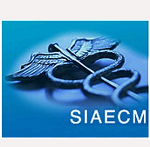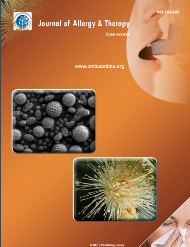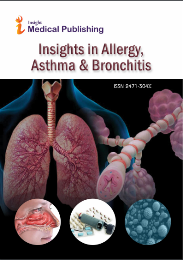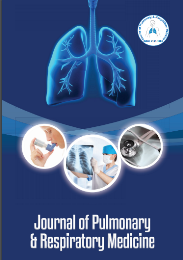Theme: Innovative Study on Immunity: To Control Asthma & Allergy
AAI Congress 2018
Conference Series llc LTD welcomes you to attend Global Congress on Asthma, Allergy and Immunology to speak on a theme “Innovative Studies on Immunity: To Control Asthma & Allergy” during November 7-8, 2018 Singapore which is going to cover all aspects on scientific and technical advances in the field of medical science, environmental science and pharmaceutical science.
The main objective of the conference is to bring together leading academicians, scientists, researchers, graduate students and business delegates from the field of medical (Pulmonologists, Allergist /Immunologists), environmental specialist & pharmaceutical specialist and others from all over the world. Asthma Congress 2018 is a three days conference organized by Organizing Committee Members where it starts with a keynote session followed by oral presentation and poster presentations and final ends with the certificate distribution.
Conference Series llc LTD Organizes 1000+ Global Events inclusive of 300+ International Conferences, 500+ Workshops and 200+ Symposiums every year across USA- Europe & Asia with support from 1000 more scientific societies and publishes 400+ Open access journals which contains over 30000 eminent personalities, reputed scientists as editorial board members.
Why to attend?
In early days, asthma is considered only as a genetic disorder and allergy caused due to some natural triggers like dust, pollen, mold and roaches but the modern age has added several triggers (mainly environmental pollution like gases, fumes, smoking etc.), which cause asthma and allergic reaction. Eventhough our own immune system supports our body with antibodies; a regular exposure to environmental triggers at our job will surely cause asthma and allergic reaction. So we are inviting environmental research scholars with a research paper, to control the pollution and toxic substance and medical professionals, to come with a research article to cure asthma and allergy by increasing the immunity and also the pharmaceutical professionals, to come up with a new dosage form or new equipment to cure asthma and allergy.
Target Audience:
· Public Health Professional
· Immunologists
· Pulmonologists
· Allergist
· Pharmaceutical Professional
· Environmental Safety Professional
Conference Series llc LTD welcomes you to attend Global Congress on Asthma, Allergy and Immunology to speak on a theme “Innovative Studies on Immunity: To Control Asthma & Allergy” during November 7-8, 2018 Singapore which is going to cover all aspects on scientific and technical advances in the field of medical science, environmental science and pharmaceutical science.
Following are the sessions and tracks which are going to discuss at AAI Congress 2018:
Track 1: Asthma
Asthma is a chronic disease involving the airways. These airways, or bronchial tubes, allow air to come in and out of the lungs.
Occupational asthma is caused by inhaling fumes, gases, dust or other potentially harmful substances while on the job. Childhood asthma impacts millions of children and their families. In fact, the majority of children who develop asthma do so before the age of five.
For many asthma sufferers, timing of these symptoms is closely related to physical activity. And, some otherwise healthy people can develop asthma symptoms only when exercising. This is called exercise-induced bronchoconstriction (EIB), or exercise-induced asthma (EIA).People with a family history of allergies or asthma are more prone to developing asthma. Many people with asthma also have allergies. This is called allergic asthma.
There is no cure for asthma, but once it is properly diagnosed and a treatment plan is in place you will be able to manage your condition, and your quality of life will improve.
Related Conferences: Asthma Conference | Allergy Conferences | Immunology Conferences | COPD Conferences | Asthma and Allergy Conference | Allergy Partners | World Asthma Day
World Immunology Congress, December 14-15, 2017 Dubai, UAE; 3rd World Congress on Public Health, Nutrition & Epidemiology, November 13-14, 2017 Osaka, Japan; 10th Asia Pacific Global Summit on Healthcare, March 12-14, 2018 Singapore; 4th International Conference on Respiratory and Pulmonary Medicine, March 21-22, 2018 Bali, Indonesia; 7th Asia Pacific Congress on Bronchology and Interventional Pulmonology November 2-4, 2017, Bali , Indonesia; Arizona Asthma Coalition 11th Annual Asthma & Allergy Clinical Conference, October 7, 2017, Arizona, USA; AAAAI/WAO Joint Congress March 2-5, 2017, Florida, USA; European Academy of Allergy and Clinical Immunology Congress May 26-30, 2018, Munich, Germany; American Academy of Allergy, Asthma and Immunology Annual Meeting and World Allergy Organization Joint Meeting, March 2-5, 2018 Orlando, United States.
New York State Society of Allergy, Asthma, & Immunology – NYSSAAI, Asthma and Allergy Association of Middle Tennessee, American Society of Allergy Nurses, European Federation of Allergy and Airways Diseases Patients' Associations (EFA), Asia Pacific Association of Allergy, Asthma and Clinical immunology.
Track 2: Allergy and Immunology
An allergy is an abnormal, acquired sensitivity to a given substance, including pollen, drugs, food, venom or numerous other environmental triggers. An allergy is a local or systemic inflammatory response to allergens. Often times symptoms are swelling of the nasal mucosa, itchy burning eyes, sneezing, wheezing, fullness in the ears and various skin rashes such as hives, or anaphylaxis, a potentially fatal reaction.
Immunology is a broad branch of biomedical science that covers the study of all aspects of the immune system in all organisms. It deals with, among other things, the physiological functioning of the immune system in states of both health and disease; malfunctions of the immune system in immunological disorders (autoimmune disease, hypersensitivities, immune deficiency).
Related Conferences: Bronchial Asthma Conferences | Lung Asthma Conferences | Asthma Triggers Conferences | Immunology Conference | Occupational Asthma | World Asthma Day
4th International Conference on Respiratory and Pulmonary Medicine, March 21-22, 2018 Bali, Indonesia; 10th Asia Pacific Global Summit on Healthcare, March 12-14, 2018 Singapore; 3rd World Congress on Public Health, Nutrition & Epidemiology, November 13-14, 2017 Osaka, Japan; World Immunology Congress, December 14-15, 2017 Dubai, UAE; American Academy of Allergy, Asthma and Immunology Annual Meeting and World Allergy Organization Joint Meeting, March 2-5, 2018 Orlando, United States; 20th International Conference on Allergy, Asthma and Immunology, May 14 - 15, 2018, London, United Kingdom; 75th Annual Congress of the American College of Allergy, Asthma & Immunology (ACAAI), November 15-19, 2018, Seattle, USA; 10th Asia Pacific Global Summit on Healthcare, March 12-14, 2018 Singapore; 4th International Conference on Respiratory and Pulmonary Medicine, March 21-22, 2018 Bali, Indonesia.
Allergy, Asthma & Immunology Foundation of Northern California, Asthma and Allergy Care, Allergy Association of New Jersey, Association of Asthma Educators, Allergy & Asthma Medical Group and Research Center, Partners Asthma Center
Track 3: Asthma Triggers
Exposure to environmental triggers or allergens can cause asthma. There are different types of environmental allergens which causes asthma where some of the allergens are dust mites, pollen, pets, mold, cockroaches and irritants.
Dust mites are tiny bugs that live in bedding, mattresses, upholstered furniture, and carpets. No matter how clean your house is, it's impossible to completely get rid of dust mites.
Grasses, trees and weeds produce pollens that travel through the air and are inhaled. They cause seasonal allergy symptoms and trigger asthma. Pollens from trees are higher in the spring, grasses in the summer and weeds in the fall. This may vary depending on weather conditions and where you live.
Allergic reactions to pets are caused by the animal's dander. Short-haired pets are not any less likely to cause a reaction than long-haired animals.
Molds are found in outdoor air and can enter your home any time you open a door or window. Any house can develop a mold problem with the right conditions. Molds like to grow on wallboard, wood, or fabrics, but they will grow any place. They thrive in damp basements and closets, bathrooms (especially showers), places where fresh food is stored, refrigerator drip trays, house plants, air conditioners, humidifiers, garbage pails, mattresses, upholstered furniture, and old foam rubber pillows.
Cockroach droppings can not only trigger allergies but can trigger and bother asthma. Since cockroaches require food and moisture to survive, you can help reduce exposure by getting rid of sources of each.
Some of the irritants like smoke, strong odors, cold air and infections will also cause asthma.
Related Conferences: Asthma Symptoms Conference | Asthma Medicine Conference | Allergy and Asthma Conference | Allergic Disease Conference | Asthma and Allergy Foundation of America
3rd World Congress on Public Health, Nutrition & Epidemiology, November 13-14, 2017 Osaka, Japan; 10th Asia Pacific Global Summit on Healthcare, March 12-14, 2018 Singapore; 4th International Conference on Respiratory and Pulmonary Medicine, March 21-22, 2018 Bali, Indonesia; World Immunology Congress, December 14-15, 2017 Dubai, UAE; Arizona Asthma Coalition 11th Annual Asthma & Allergy Clinical Conference, October 7, 2017, Arizona, USA; AAAAI/WAO Joint Congress March 2-5, 2017, Florida, USA; European Academy of Allergy and Clinical Immunology Congress May 26-30, 2018, Munich, Germany; American Academy of Allergy, Asthma and Immunology Annual Meeting and World Allergy Organization Joint Meeting, March 2-5, 2018 Orlando, United States; 20th International Conference on Allergy, Asthma and Immunology, May 14 - 15, 2018, London, United Kingdom.
Allergy & Asthma Center CA, Arizona Allergy and Asthma Society, AAFAKC, Southeastern Allergy, Asthma and Immunology Society, American Latex Allergy Association, World Asthma Day
Track 4: Asthma Medications
Asthma medication plays a key role in how well you control your condition. There are two main types of treatment, each geared toward a specific goal.
Controller medications are the most important because they prevent asthma attacks. When you use these drugs, your airways are less inflamed and less likely to react to triggers.
Quick-relief medications -- also called rescue medications -- relax the muscles around your airway. If you have to use a rescue medication more than twice a week, your asthma isn’t well-controlled. But people who have exercise-induced asthma may use a quick-acting med called a beta-agonist before a workout.
The right medication should allow you to live an active and normal life. If your asthma symptoms aren’t controlled, ask your doctor to help you find a different treatment that works better.
Related Conferences: Respiratory Allergy Conference | Allergy Diagnosis Conference | Allergic Reaction Conference | Asthma Devices Conference | World Asthma Day
10th Asia Pacific Global Summit on Healthcare, March 12-14, 2018 Singapore; 4th International Conference on Respiratory and Pulmonary Medicine, March 21-22, 2018 Bali, Indonesia; World Immunology Congress, December 14-15, 2017 Dubai, UAE; 3rd World Congress on Public Health, Nutrition & Epidemiology, November 13-14, 2017 Osaka, Japan; European Academy of Allergy and Clinical Immunology Congress May 26-30, 2018, Munich, Germany; American Academy of Allergy, Asthma and Immunology Annual Meeting and World Allergy Organization Joint Meeting, March 2-5, 2018 Orlando, United States; 20th International Conference on Allergy, Asthma and Immunology, May 14 - 15, 2018, London, United Kingdom; 75th Annual Congress of the American College of Allergy, Asthma & Immunology (ACAAI), November 15-19, 2018, Seattle, USA; World Immunology Congress, December 14-15, 2017 Dubai, UAE.
American Society of Allergy Nurses, European Federation of Allergy and Airways Diseases Patients' Associations (EFA), Asia Pacific Association of Allergy, Asthma and Clinical immunology
Track 5: Allergy Medication
In general, there is no cure for allergies, but there are several types of medications available -- both over-the-counter and prescription -- to help ease and treat annoying symptoms like congestion and runny nose. These allergy drugs include antihistamines, decongestants, combination drugs, corticosteroids and others.
Immunotherapy in the form of allergy shots or pills under the tongue, which gradually increase your ability to tolerate allergens, are also available.
Related Conferences: Lung Asthma Conference | Pediatric Asthma Conference | Pulmonology Conference | Public Health Conference | Allergy and Clinical Immunology Conference
4th International Conference on Respiratory and Pulmonary Medicine, March 21-22, 2018 Bali, Indonesia; 10th Asia Pacific Global Summit on Healthcare, March 12-14, 2018 Singapore; 3rd World Congress on Public Health, Nutrition & Epidemiology, November 13-14, 2017 Osaka, Japan; World Immunology Congress, December 14-15, 2017 Dubai, UAE; American Academy of Allergy, Asthma and Immunology Annual Meeting and World Allergy Organization Joint Meeting, March 2-5, 2018 Orlando, United States; 20th International Conference on Allergy, Asthma and Immunology, May 14 - 15, 2018, London, United Kingdom; 75th Annual Congress of the American College of Allergy, Asthma & Immunology (ACAAI), November 15-19, 2018, Seattle, USA; 10th Asia Pacific Global Summit on Healthcare, March 12-14, 2018 Singapore; 4th International Conference on Respiratory and Pulmonary Medicine, March 21-22, 2018 Bali, Indonesia.
Swedish Asthma and Allergy Association, Western Society of Allergy, Asthma & Immunology, Tennessee Society of Allergy, Asthma and Immunology, The Illinois Society of Allergy, Asthma and Immunology (ISAAI), Colorado Allergy and Asthma Society | CAAS, World Asthma Day
Track 6: Allergens and Allergies
Allergies are one of the most common chronic diseases. A chronic disease lasts a long time or occurs often. An allergy occurs when the body’s immune system sees a substance as harmful and overreacts to it. The substances that cause allergic reactions are allergens. When someone has allergies, their immune system makes an antibody called immunoglobulin E (IgE). These antibodies respond to allergens.
Related Conferences: Pediatric Allergy Conference | Allergy Medication Conference | Food Allergy Conference | Asthma Treatment Conference | Genetic Asthma Conference
World Immunology Congress, December 14-15, 2017 Dubai, UAE; 3rd World Congress on Public Health, Nutrition & Epidemiology, November 13-14, 2017 Osaka, Japan; 10th Asia Pacific Global Summit on Healthcare, March 12-14, 2018 Singapore; 4th International Conference on Respiratory and Pulmonary Medicine, March 21-22, 2018 Bali, Indonesia; 7th Asia Pacific Congress on Bronchology and Interventional Pulmonology November 2-4, 2017, Bali , Indonesia; Arizona Asthma Coalition 11th Annual Asthma & Allergy Clinical Conference, October 7, 2017, Arizona, USA; AAAAI/WAO Joint Congress March 2-5, 2017, Florida, USA; European Academy of Allergy and Clinical Immunology Congress May 26-30, 2018, Munich, Germany; American Academy of Allergy, Asthma and Immunology Annual Meeting and World Allergy Organization Joint Meeting, March 2-5, 2018 Orlando, United States.
CSAAI | California Society of Allergy, Asthma and Immunology, Midlands Asthma and Allergy Research Association, Denver Allergy & Asthma Associates, Annals of Allergy, Asthma & Immunology.
Track 7: Occupational Asthma
Occupational asthma has become the most common work-related lung disease in developed countries. However, the exact number of newly diagnosed cases of asthma in adults due to occupational exposure is unknown.
Occupational asthma is caused by inhaling fumes, gases, dust or other potentially harmful substances while "on the job." Often, your symptoms are worse during the days or nights you work, improve when you have time off and start again when you go back to work.
Related Conferences: Allergy Diagnosis Conference | Healthcare Conference | Asthma Stages Conference | Occupational Health Conference
4th International Conference on Respiratory and Pulmonary Medicine, March 21-22, 2018 Bali, Indonesia; 10th Asia Pacific Global Summit on Healthcare, March 12-14, 2018 Singapore; 3rd World Congress on Public Health, Nutrition & Epidemiology, November 13-14, 2017 Osaka, Japan; World Immunology Congress, December 14-15, 2017 Dubai, UAE; American Academy of Allergy, Asthma and Immunology Annual Meeting and World Allergy Organization Joint Meeting, March 2-5, 2018 Orlando, United States; 20th International Conference on Allergy, Asthma and Immunology, May 14 - 15, 2018, London, United Kingdom; 75th Annual Congress of the American College of Allergy, Asthma & Immunology (ACAAI), November 15-19, 2018, Seattle, USA; 10th Asia Pacific Global Summit on Healthcare, March 12-14, 2018 Singapore; 4th International Conference on Respiratory and Pulmonary Medicine, March 21-22, 2018 Bali, Indonesia.
The American Academy of Allergy, Asthma & Immunology, Asthma and Allergy Foundation of America, Pennsylvania Allergy and Asthma Association, American Lung Association, Allergy/Asthma Information Association.
Track 8: Asthma Stages
As determined by the National Institutes of Health, the following is a guideline used by doctors to help determine the extent of asthma in your child. It is classified as "steps" because each child may step up or step down to different levels at any time.
The steps are as follows:
Step 1 or intermittent asthma: This group of children has symptoms no more than two times a week, do not have problems in-between flare-ups, and only have short flare-ups from a few hours to a few days. Nighttime symptoms occur less than two times a month.
Step 2 or mild persistent: This group of children has symptoms more than two times a week, but not daily, and may have activity levels affected by the flare-ups. Nighttime symptoms occur greater than two times a month, but no more than once per week.
Step 3 or moderate persistent: This group of children has symptoms every day, use their rescue medication every day, and may have activity levels affected by the flare-ups. Nighttime symptoms occur greater than one time a week.
Step 4 or severe persistent: This group of children has symptoms multiple times per day, have a decrease in their physical activity, and have frequent flare-ups. Nighttime symptoms occur frequently.
Related Conferences: Asthma Regulators Conference | Hay Fever Conference | Pollen Allergy Conference | Allergy Conference | Immunology Conference
3rd World Congress on Public Health, Nutrition & Epidemiology, November 13-14, 2017 Osaka, Japan; 10th Asia Pacific Global Summit on Healthcare, March 12-14, 2018 Singapore; 4th International Conference on Respiratory and Pulmonary Medicine, March 21-22, 2018 Bali, Indonesia; World Immunology Congress, December 14-15, 2017 Dubai, UAE; Arizona Asthma Coalition 11th Annual Asthma & Allergy Clinical Conference, October 7, 2017, Arizona, USA; AAAAI/WAO Joint Congress March 2-5, 2017, Florida, USA; European Academy of Allergy and Clinical Immunology Congress May 26-30, 2018, Munich, Germany; American Academy of Allergy, Asthma and Immunology Annual Meeting and World Allergy Organization Joint Meeting, March 2-5, 2018 Orlando, United States; 20th International Conference on Allergy, Asthma and Immunology, May 14 - 15, 2018, London, United Kingdom.
United Action for Allergy and Asthma, Food Allergy Research & Education: FARE, American Academy of Physician Assistants in Allergy, Asthma & Immunology, The Asthma & Allergy Foundation of America of Maryland, New York Allergy and Asthma Society.
Track 9: COPD
Chronic Obstructive Pulmonary Disease (COPD) is an umbrella term used to describe progressive lung diseases including emphysema, chronic bronchitis, refractory (non-reversible) asthma, and some forms of bronchiectasis. This disease is characterized by increasing breathlessness.
Many people mistake their increased breathlessness and coughing as a normal part of aging. In the early stages of the disease, you may not notice the symptoms. COPD can develop for years without noticeable shortness of breath. You begin to see the symptoms in the more developed stages of the disease and the symptoms are increased breathlessness, Frequent coughing (with and without sputum), wheezing and tightness in the chest.
Related Conferences: Rhinology and Allergy Conference | Food Allergy Conference | Asthma Allergy and Immunology Conference | Asthma and COPD Conference
10th Asia Pacific Global Summit on Healthcare, March 12-14, 2018 Singapore; 4th International Conference on Respiratory and Pulmonary Medicine, March 21-22, 2018 Bali, Indonesia; World Immunology Congress, December 14-15, 2017 Dubai, UAE; 3rd World Congress on Public Health, Nutrition & Epidemiology, November 13-14, 2017 Osaka, Japan; European Academy of Allergy and Clinical Immunology Congress May 26-30, 2018, Munich, Germany; American Academy of Allergy, Asthma and Immunology Annual Meeting and World Allergy Organization Joint Meeting, March 2-5, 2018 Orlando, United States; 20th International Conference on Allergy, Asthma and Immunology, May 14 - 15, 2018, London, United Kingdom; 75th Annual Congress of the American College of Allergy, Asthma & Immunology (ACAAI), November 15-19, 2018, Seattle, USA; World Immunology Congress, December 14-15, 2017 Dubai, UAE.
Princeton Allergy & Asthma Associates, Canadian Allergy, Asthma and Immunology Foundation, Allergy & Asthma Physicians, Arizona Asthma Coalition, American Board of Allergy and Immunology.
Track 10: Miscellaneous
There are some well-known and obvious triggers you should avoid when you have asthma —cold air, dust mites, pollen, tobacco smoke, mold, and pet dander among them. But what about your favorite candle, thunderstorms, aspirin, or even traffic? Several odd or unusual things can trigger an asthma attack. If you have asthma, it’s important to identify your own particular triggers so you can try to avoid or at least be better prepared for a potential attack.
Related Conferences: Allergy, Asthma and Clinical Immunology Conference | Respiratory and Pulmonary Medicine Conference | Bronchology and Pulmonology Conference | Public Health Conference
World Immunology Congress, December 14-15, 2017 Dubai, UAE; 3rd World Congress on Public Health, Nutrition & Epidemiology, November 13-14, 2017 Osaka, Japan; 10th Asia Pacific Global Summit on Healthcare, March 12-14, 2018 Singapore; 4th International Conference on Respiratory and Pulmonary Medicine, March 21-22, 2018 Bali, Indonesia; 7th Asia Pacific Congress on Bronchology and Interventional Pulmonology November 2-4, 2017, Bali , Indonesia; Arizona Asthma Coalition 11th Annual Asthma & Allergy Clinical Conference, October 7, 2017, Arizona, USA; AAAAI/WAO Joint Congress March 2-5, 2017, Florida, USA; European Academy of Allergy and Clinical Immunology Congress May 26-30, 2018, Munich, Germany; American Academy of Allergy, Asthma and Immunology Annual Meeting and World Allergy Organization Joint Meeting, March 2-5, 2018 Orlando, United States.
Allergy & Asthma Network Mothers of Asthmatics (AANMA), Kids With Food Allergies, Allergy, Asthma, & Immunology Associates of Tampa Bay, Food Allergy Organizations, Allergy, Asthma and Dermatology.
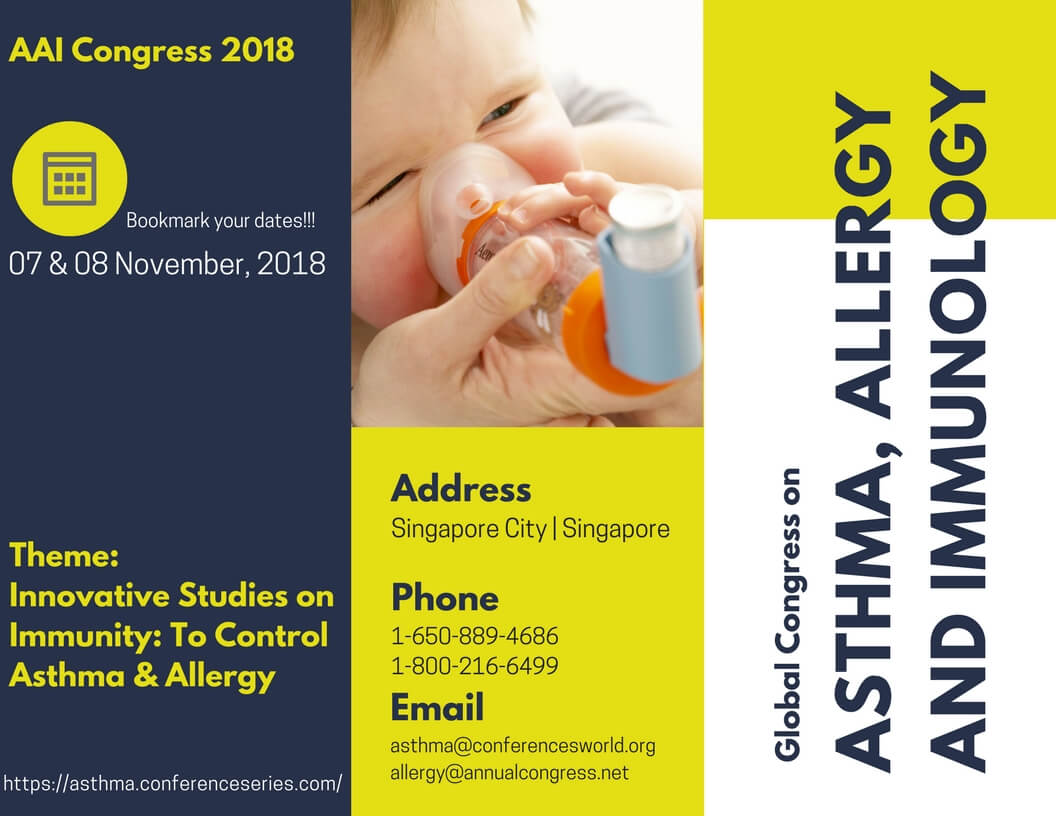
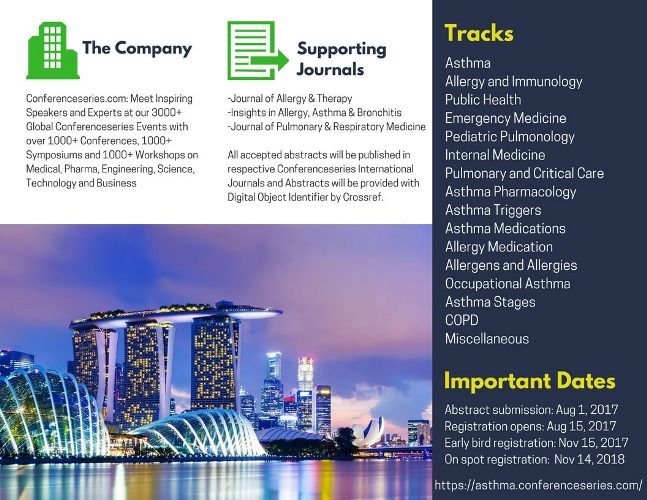
Conference Highlights
To share your views and research, please click here to register for the Conference.
To Collaborate Scientific Professionals around the World
| Conference Date | November 07-08, 2018 | ||
| Sponsors & Exhibitors |
|
||
| Speaker Opportunity Closed | Day 1 | Day 2 | |
| Poster Opportunity Closed | Click Here to View | ||
Useful Links
Special Issues
All accepted abstracts will be published in respective Our International Journals.
- Journal of Allergy & Therapy
- Insights in Allergy, Asthma & Bronchitis
- Journal of Pulmonary & Respiratory Medicine
Abstracts will be provided with Digital Object Identifier by










